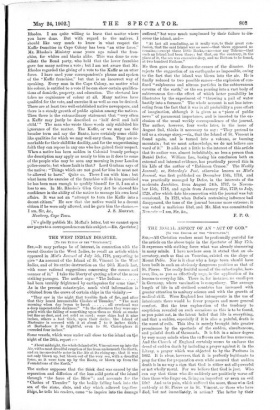THE WEST INDIAN DISASTER.
[To THE EEITOR Or THE "SPEOTAT011.21
Snt,—It may perhaps be of interest, in connection with the recent disaster in the West Indies, to recall an article which
appeared in Mist's Journal of July 5th, 1718, purporting to give "An account of the Island of St. Vincent in the West Indies, and of its entire destruction on the 26th March last,
with some rational suggestions concerning the causes and manner of it." I take the liberty of quoting a few of the more striking passages. The author says : "The Indians
had been terribly frightened by earthquakes for some time." As in the present catastrophe, much vivid information is obtained from the crews of certain ships in the vicinity :— "They saw in the night that terrible flash of fire, and after that they heard innumerable Clashes of Thunder." "The next
morning when day began to break all overhead was a deep impenetrable darkness." "In the afternoon they were sur- priz'd with the falling of something upon them as thick as smoke but fine as dust, and yet solid as sand ; some ships had it nine inches, others a foot thick, upon their decks; the Island of Martenico is covered with it at about 7 to 9 inches thick; at Barbadoes it is frightful, even to St. Christophers it exceeded four inches."
Some vessels, which were under sail close to the island on ttLe night of the 26th, report
Abeut midnight, the whole Island of St. Vincent rose up into the Air, with a most dreadful eruption of fire from underneath the Earth, and an inconceivable noise in the Air at its rising up ; that it was not only blown up, but blown out of the very sea, with a dreadful force, as it were torn up by the Boots, or blown up from the Foundations of the Earth."
The author supposes that the thick dust was caused by the separation and diffusion of the less solid parts of the island through "the force of the Blow" ; and accounts for the "Clashes of Thunder" by the bodily falling back into the sea of the stone, slate, and clay which adhered together. Ships, he tells his readers, came "to inquire into the damage suffered," but were much nonplussed by their failure to dis- cover the island, and— "At last all ooncluding, as it really was, to their great con- fusion, that the said Island was no more—that there appeared no remains,—except three little Rocks,—no—nor any Tokens—that such an Island had been there; but that, on the contrary, in the place of it, the sea was excessive deep, and no Bottom to be found, at two hundred Fathom."
He then goes on to discuss the causes of the disaster. He rejects the suggestion of an earthquake as impossible, owing to the fact that the island was blown into the air. He is finally reduced to two possible causes—the explosion of con- fined "sulphurous and nitrous particles in the subterranean
caverns of the earth," or the sea pouring into a vast body of subterranean fire—the effect of which latter possibility he illustrates by the experiment• of "throwing a pail of water
hastily into a furnace." The whole account is not less inter- esting from the fact that it was in all probability a pure effort of imagination, although it is given as a "piece of publics news" of paramount importance, and is inserted to the ex-
clusion of the usual weekly correspondence of the journal. The author, however, four weeks later, in the issue of August 2nd, thinks it necessary to say : "They pretend to tell us a strange story,—viz., that the Island of St. Vincent is found again, and is turned into a volcano, or burning mountain ; but we must acknowledge, we do not believe one word of it." It adds not a little to the interest of this article that its author was, almost indubitably, no less a person than Daniel Defoe. William Lee, basing his conclusion both on external and internal evidence, has practically proved this in his Life of the author of "Robinson Crusoe." The Weekly Journal; or, Saturday's Post, otherwise known as Mist's Journal, was first published on December 15th, 1716, and was practically managed by Defoe, in the interests of the moderate Jacobites, from August 24th, 1717, to Novem- ber 15th, 1718, and again from January 31st, 1719, to July, 1720, after which date his connection with the journal was but
occasional. In 1721, when Defoe's restraining influence had disappeared, the tone of the journal became more extreme; it was voted a malicious libel, and Mr. Mist was committed to Newoate —.I am, Sir, &c., F. P.O.






































 Previous page
Previous page